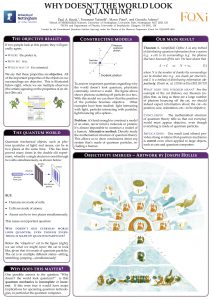
March 9, 2018, by jicke
Mathematicians take research to Parliament
Five mathematicians from the University of Nottingham are heading to Parliament on Monday to present their mathematics research to a range of politicians and a panel of expert judges, as part of STEM for BRITAIN.
Research fellows Dr Claire Mcllroy and Dr Paul Knott and PhD researchers Emily Mitchell, Linda Irons and Elizabeth Holden were shortlisted from hundreds of applicants to present posters describing their research to Parliament. These will be judged against dozens of other scientists’ research in the only national competition of its kind.
The research topics they are presenting on are: how mathematics can be used to understand and advance 3D printing techniques, why the world doesn’t look quantum, using maths to inform tissue engineering design, winter wheat production in England and Wales from an extreme value perspective and mathematical modelling of cell adhesion in asthma.
Reaching a broader audience
Dr Mcllroy commented: “I am thrilled that this opportunity will enable my research to reach a broader audience. My goal is to excite people about the prospects of 3D printing, particularly in the medical field, and promote the need for multi-disciplinary research – a mathematical approach to practical engineering problems is key. I hope that making research accessible in this way inspires future generations to pursue careers in STEM.”
STEM for BRITAIN is a poster competition in the House of Commons – involving approximately 180 early stage or early career researchers – judged by professional and academic experts. All presenters are entered into either the engineering, the biological and biomedical sciences, the physical sciences (chemistry), the physical sciences (physics) session, or the mathematics session, depending on the researcher’s specialism.

Dr Knott said: “I saw STEM for BRITAIN as a fantastic opportunity for me to share my research with politicians and the wider public. My research connects quantum mechanics with questions about our familiar everyday world, and as such I hope to inspire and encourage the politicians and judges I will meet in Parliament to see the world around us in a whole new light.”
Important date in calendar
Stephen Metcalfe MP, Chairman of the Parliamentary and Scientific Committee, said:
“This annual competition is an important date in the parliamentary calendar because it gives MPs an opportunity to speak to a wide range of the country’s best young researchers. These early career engineers, mathematicians and scientists are the architects of our future and STEM for BRITAIN is politicians’ best opportunity to meet them and understand their work.”
The research has been entered into the mathematical sciences session of the competition, which will end in a gold, silver and bronze prize-giving ceremony.
Judged by leading academics, the gold medalist receives £2,000, while silver and bronze receive £1,250 and £750 respectively.
The Parliamentary and Scientific Committee runs the event in collaboration with the Royal Academy of Engineering, the Royal Society of Chemistry, the Institute of Physics, the Royal Society of Biology, The Physiological Society and the Council for the Mathematical Sciences, with financial support from the Clay Mathematics Institute, UK Research and Innovation, Warwick Manufacturing Group, Society of Chemical Industry, the Nutrition Society, Institute of Biomedical Science and the Heilbronn Institute for Mathematical Research.
Good luck to all of you!
No comments yet, fill out a comment to be the first

Leave a Reply